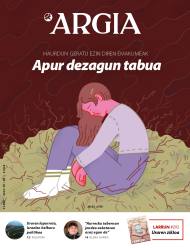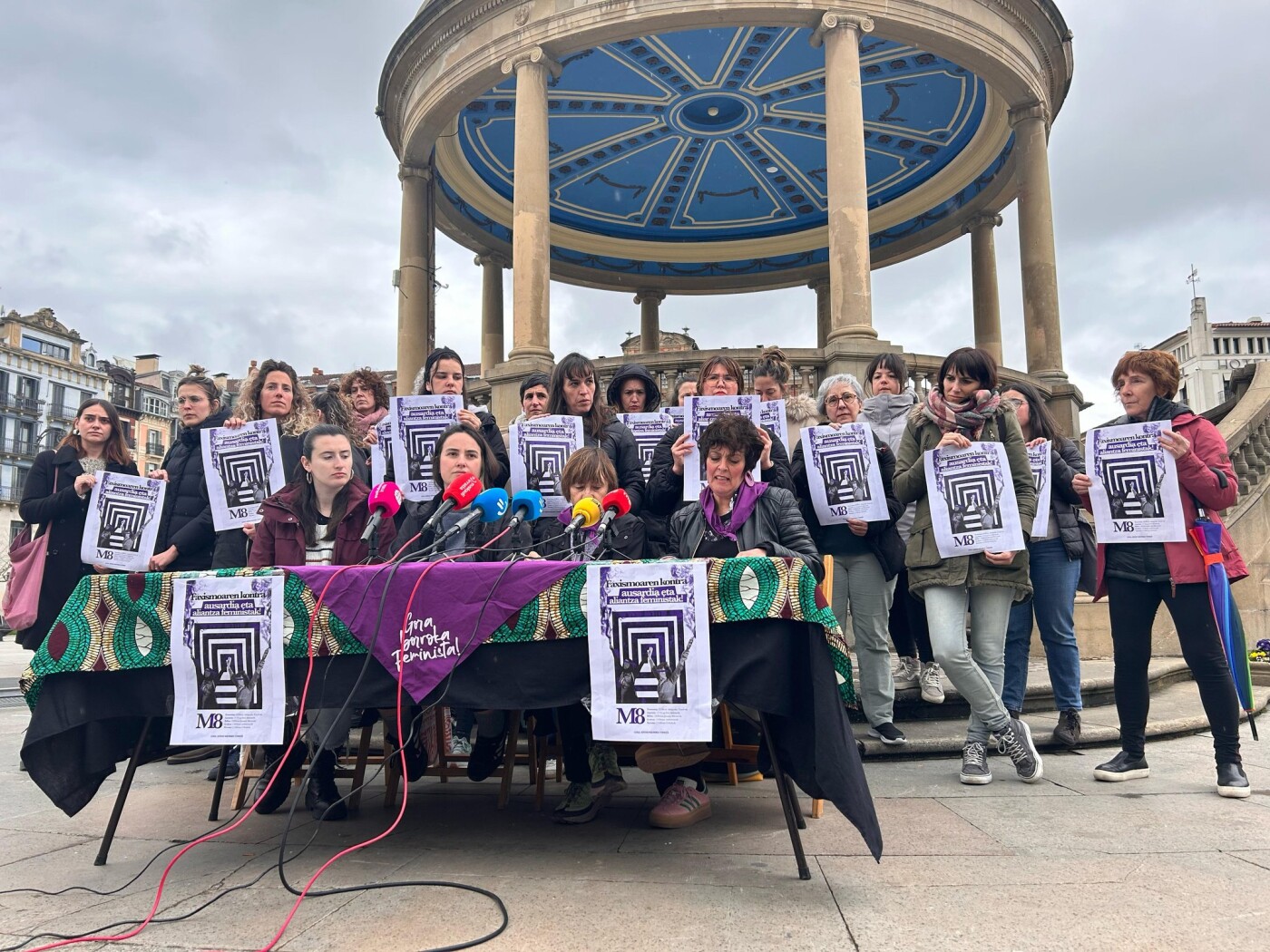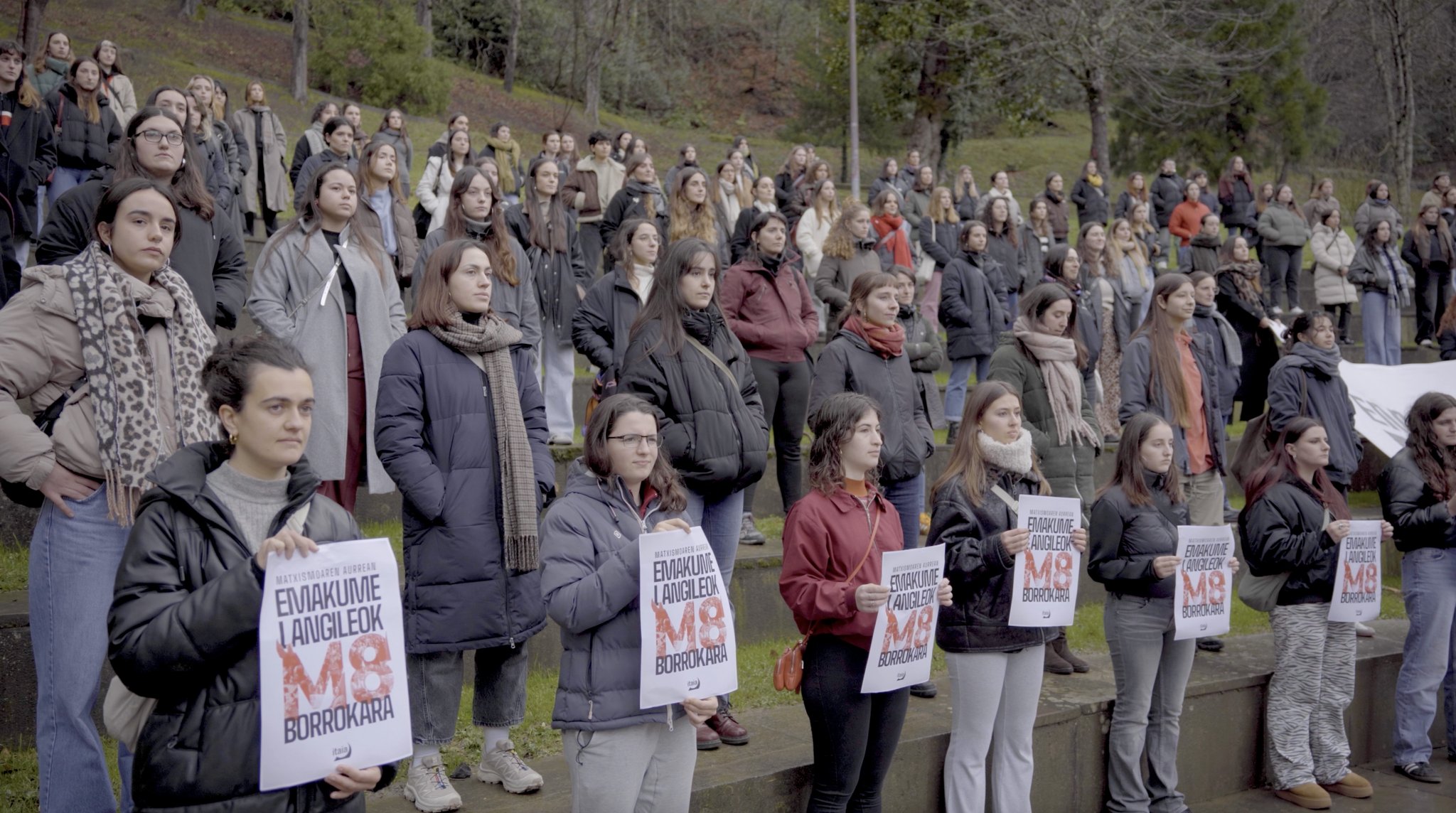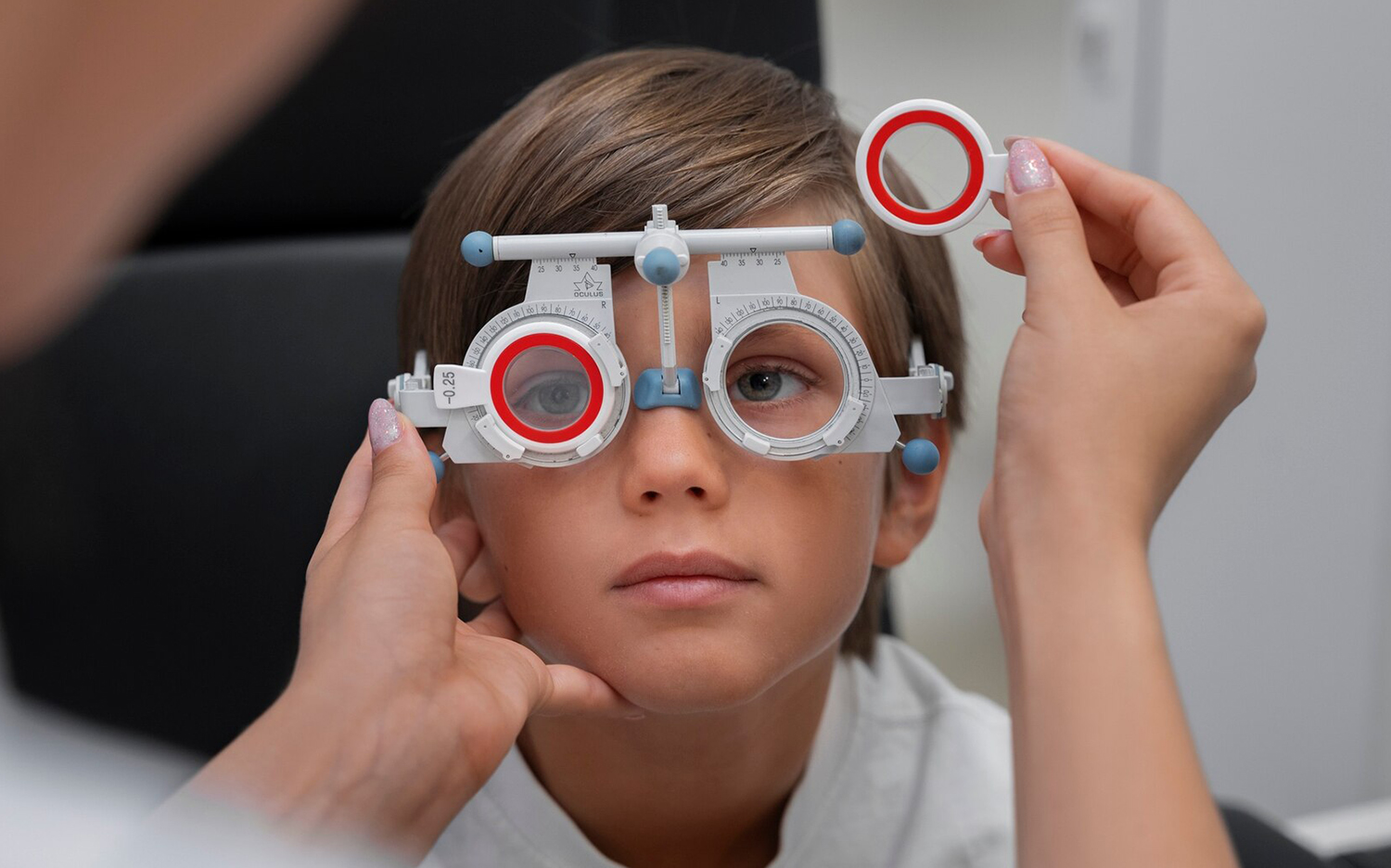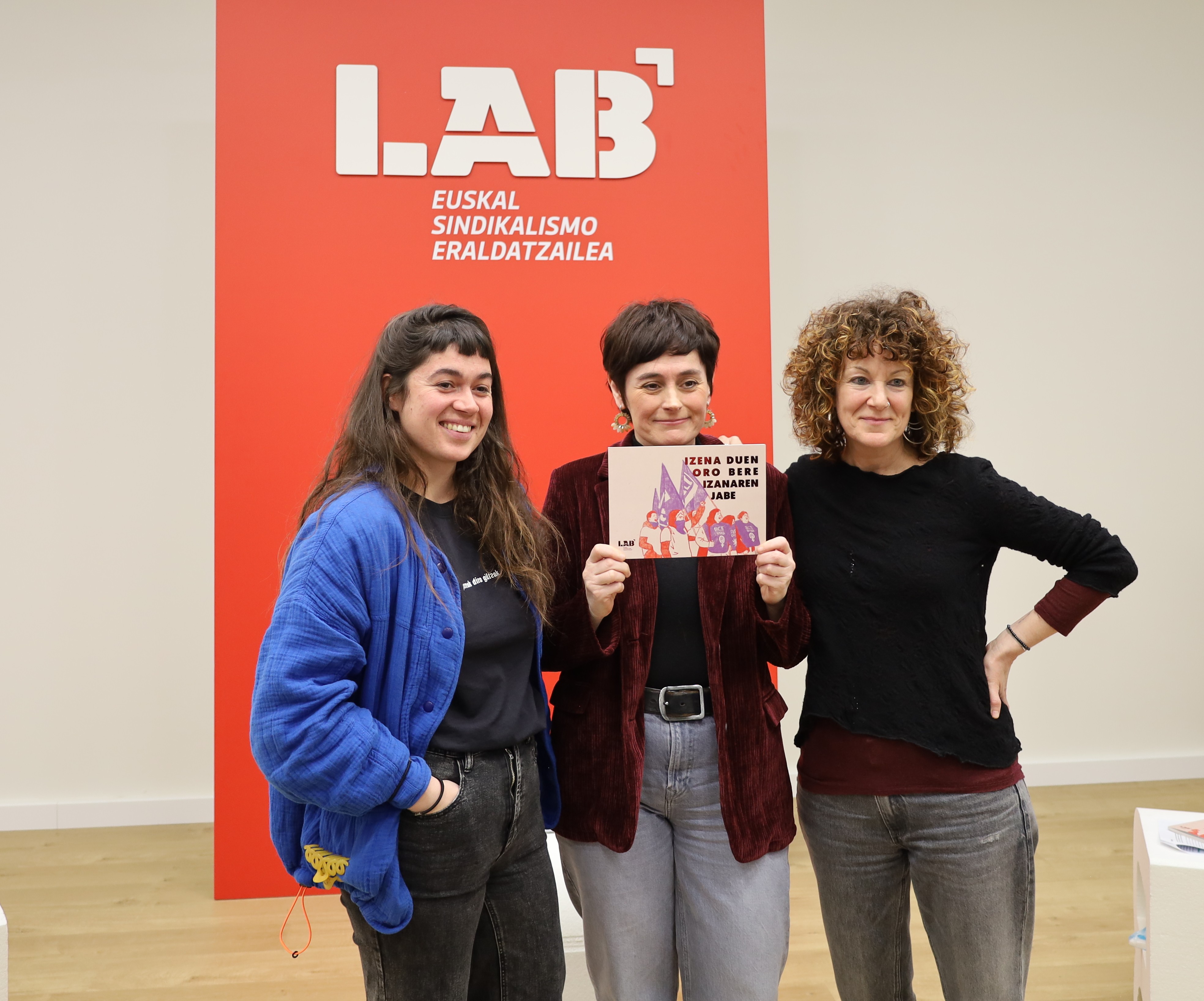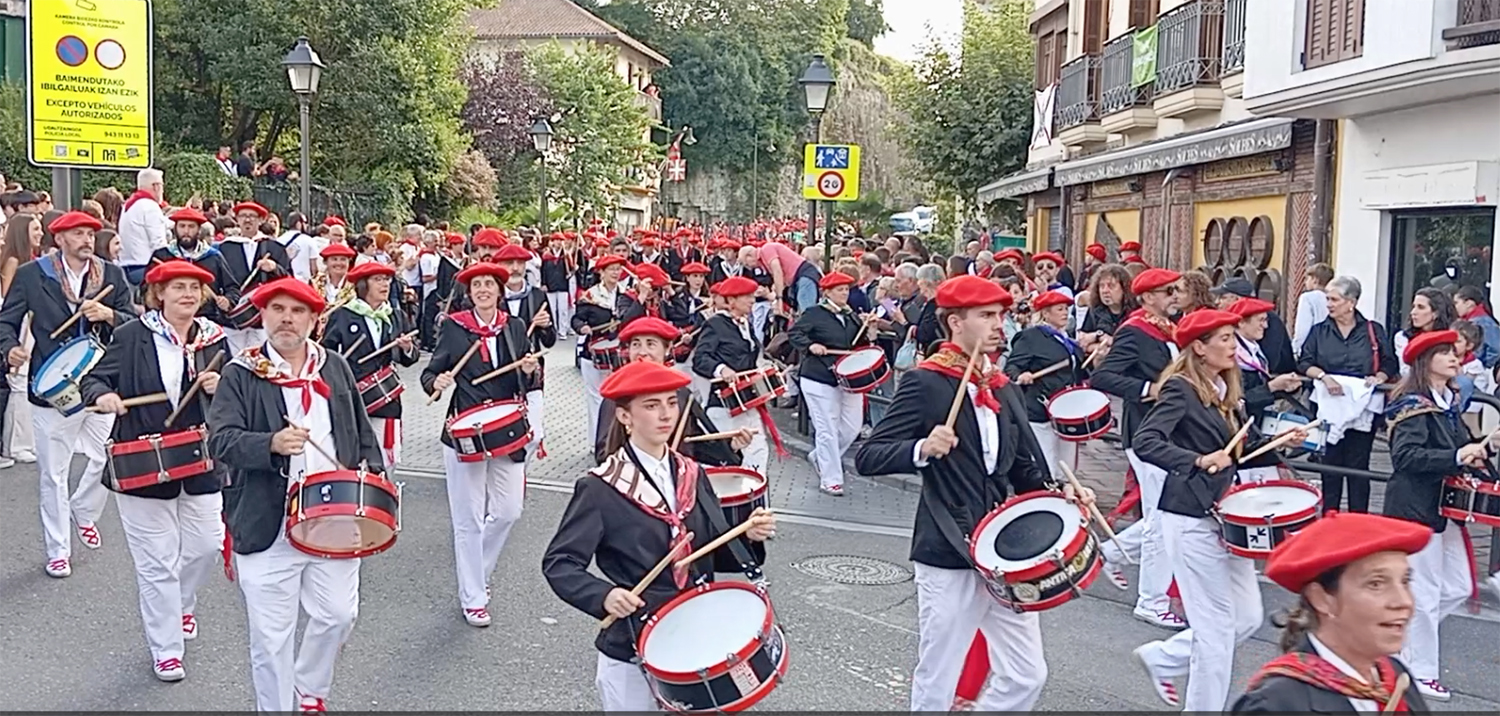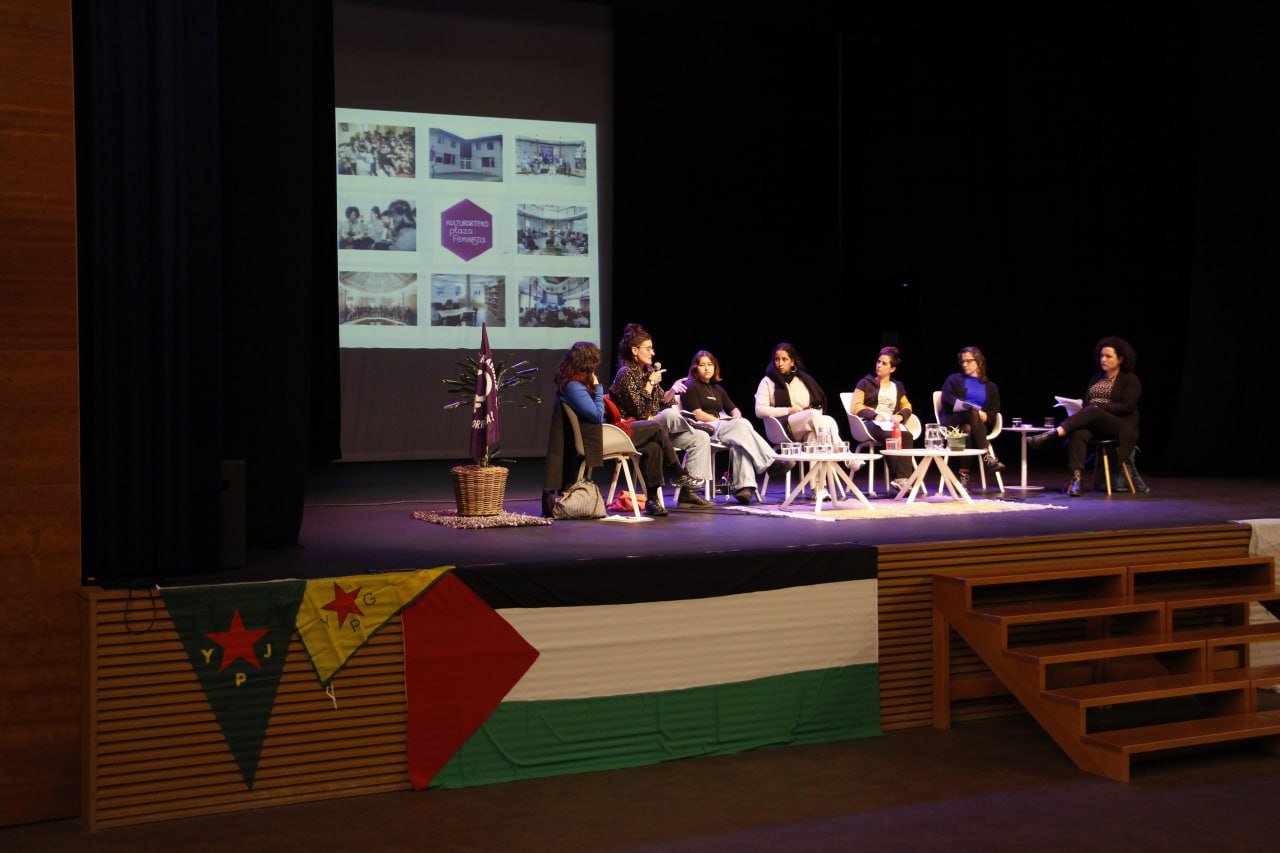“Have a bar just to take wine step”
- In this house you know Elena Guinea: In December 2021, it appeared on the cover of the magazine, with a single breast and smiling, accompanied by Sandra Barkaiztegi and Olatz Mercader. Other podcast attendees from the association Iñurri (Min), awarded last year with the Argia Prize. But for a lot of transmaribollos from San Sebastian and surroundings, Elenita is, above all, the soul of the Aurresku bar. Closure in September.

Elena Guinea. Lasarte-oria, 1967
He studied teaching. In this field and after other works, it has been a tabernacle in the last two decades. More than a bar, he wanted to create projects related to culture, Euskera and feminism. Izan Iñurri is now engaged in cancer awareness and discourse. Enjoy the performances of bertsolaris. They have already held 18 sessions and in 2024 they will travel to Tolosa and Oiartzun, among others.
You're from Lasarte-Oria. How do you remember your childhood, your youth…?
I am from the Oria side and grew up very comfortable in the Ozaran neighborhood. It's always been a very hardworking neighborhood. As an anecdote: I am 56 years old, 50 years ago it was very rare to see a girl in the football suit, but I always played soccer with the young people in the neighborhood, and the equipment of my two brothers was what I liked the most. People were surprised by that, and at home my mother told me I had to go with the dresses, but I hated them and I always went with the pants. Now things have changed, fortunately, and when I see children and young people today I get envy.
Grow here, live here. You have actively participated in the construction of the village. In
my life I regret just as much of a few things, but I'm very proud and I feel that the best thing I've done in my life has been to learn Euskera into adulthood. Upon completion of the teaching, I started working in Gautena with autistic children and adolescents, while learning Basque. My whole family is a Castilian parasitic, and my brother and I started at AEK. For me it was a revolution, a transformation, my life changed from top to bottom. Those who have always known Euskera do not realize, but suddenly the acquisition of a language, their language, to me was a huge chalk. I started seeing our country differently for the Basque.
He has been involved in various areas.
First I was collaborating in the organization of the Korrika, and then my militancy started a little bit. Then I was very young in the creation of the Euskera Marathon of Lasarte-Oria, in the Basque group, in the free radio Tximua and in the cultural group Tximua, organizing the people’s festivities; then I have been in the political militancy, in the Lasarte-Oria People’s Union, in the Union, in EH Bildu… I have always been.
Then came feminism across the Abertzale left. We were in Egizan and founded the Aiña group, a very positive experience. And I also got a military touch at Relatives and Etxerate, because a brother was in prison for years.
In the last twenty-one years he has worked as bar.En the group of prisoners of the village was Patxi, my current partner, and he had to take over the management of Xirimiri
— the bar of the village of Lasarte-Oria. I was unemployed at the time and proposed to take the bar half. There I started at the bar, with Patxi, then we got to know each other better and our relationship emerged; 25 years ago, think! Years later I started in the village of the Old Part of San Sebastian, where I was ten years old and peak.
Did the question of village bars affect you?
I was forgotten! Yes, I was already in San Sebastian, there were some explorations, I had a strong exploration while I was just in the bar. They drove out all the people and let another person come in as a witness, the whole street surrounded by civil guards… I had to go and declare to the National Audience also on the subject of pictures of prisoners. The bar put me in an attorney, [Iñigo] Iruin, and I did what he told me. They filed the case.
It wouldn't have been easy.
Well, I knew nothing was going to happen, but I had to swallow. Again, when we were in Egé, we went to Vitoria to occupy Emakunde in defence of the rights of women prisoners. The Ertzaintza came and stopped us again. We spent the whole day in dungeon, but then we managed to archive that cause.
"I swore in Aurreskun that there would be people in total freedom, that nobody would come with anyone because they're gay, because they're trans or because you lack an arm."
In 2015 they took part Patxi and you in the bar Aurresku, also in Ikatz Street.
Yes, we chose to rent the premises. When we took it, I didn't know what we had to do with the drink or with the money, and it seemed the same, but I swore that in Aurreskun there were going to be people with complete freedom, that nobody was going to come in with anybody because they were gay, or trans, or because you're missing an arm or I don't know what. That was very clear to me, and I still remember that a couple came to the bar very soon after it opened, a hether couple, and they laugh at a kid, mimicking their gestures, because they were "effeminate" in quotation marks, and I remember feeling super good when I told him: “You go to the street.” They told me they were joking, but I was very serious. And I sent them. We have then managed these situations well between customers and workers and have tried never to accept any attack. It's amazing that it's free to create a safe space like this.
And then, knowing that gigantic, wonderful movement of feminism has been immense to me, and it has always been a support. For me, Aurresku, more than one bar was a project, a space, we were also trying to do things about Basque culture, especially creative women. What am I going to tell you?
.jpg)
It has been an aurresku house for popular movements in Donostia, especially for transfeminists and transmarivolloas.
There are few places in Donostia. It's a little bit pathetic in that sense, and it's a pity. It's also important for me to have those sites. For example, two years ago we created the collective transmaribibollo of Lasarte-Oria, and there I was also from my birth, very happy, very productive. So far we have been feeding internally and now we have begun to expand.
Two years ago they made the first demonstration on 28 June, right?
Yes. Before we always went to the San Sebastian demonstration from Lasarte-Oria, and it was more anonymous, but our goal is to give visibility to the people.
They have also carried out many cultural activities in Aurresku.
It was clear from the beginning that I wanted to do that, and it is a pity that the place is very small, but we have done our little things, also on the street: monologues, concerts, bertess sessions, book presentations, all kinds of parties… And we also did a great apostasy campaign. In this Catholic patriarchal society hetera, etc., to break a bit with it, we pass information about what apostasis is and how it is done. It went very well and we ended up with a party. I also did apathy and I'm very proud to have done it.
How did you experience the pandemic?
Well, also in the pandemic. We created the group SOS Hostelería, there they also stopped me, we chained in the deputation and the dungeon. But the hospitality industry is not organized, there are hardly any unions, no workers or owners, most are self-employed. This has allowed me to see people's goals. When the money is at stake, they want to give everything and make eight thousand manias, but for the money of each and every point. If it is to improve the Casco Viejo, or by culture… nothing. Among the bars there are also very supportive people, huh? But they're always.
"I was suffering, I could not contribute anything to the bar, with all brown Patxi, and we said: “So we can’t take it.” To manage badly, we won't manage it."
They closed the bar in September 2023. How did they make the decision?
The closure decision is mainly due to diseases. It's been eight years, right in September. At first we managed Patxi and I, super well, but soon after Patxi was with cancer — there is still cancer, there is no cure for his type of cancer, but now he is stable and well — and he had to leave: he was admitted, operations, ICU, chemotherapy… When I helped him, but I stayed alone in the bar. I took the backpack and forward, and in Aurresku many beautiful things have emerged.
Two years ago I had cancer, I've been off for almost two years, so I couldn't participate, even cultural acts were interrupted with the pandemic and I had no strength to recover them. And having a bar just to get wine, pass; my goal was another kind of bar, another project. From the beginning also when I've been in the village bars.
At the end of July I was discharged, I tried to lengthen the drop by all means, but not, that I was already cured. The fact is, I've been left with the pills very tired, very weak, with the whole body hurt, and I didn't see myself to work. When diseases come like this, philosophy changes. I was suffering, I couldn't contribute anything to the bar, with all brown Patxi, and we said: “So we can’t take it.” We are not going to manage it badly. So before we go into debt, we decided to close it with dignity.
You talk about cancer and many people know you as a member of the Iñurri association. What is Iñurri?
The Izan Iñurri association began very simply in Lasarte-Oria, founded by Julene Illarramendi and Miren Cuerdo to work cancer from a feminist perspective. Four or five years ago, and I almost had a relationship with them from the beginning, especially when Patxi got sick. I said, "I know you're doing something about cancer, and well we're here, the partner is not willing to show up or say anything, but I think caregivers and collaborators also have a role." And of course, they helped me and cared for me. We had this shock, and when I was with cancer, the first thing was to call Julen. “I have breast cancer.”
What has been the process after diagnosis?
I had four interventions in two breasts, and after the fourth one, I was still in the cancer and I had a mastectomy, my chest was removed. I left it like this, without remaking or prosthetic, I was very clear. When I came home from the hospital, I was walking around. I said, let's see, I know a lot of people who have taken their chest off, but physically I don't know anyone with one chest, I don't see him naked or dressed. And it was strange to me.
To make this reality visible, among other things, from the partnership you have made calendars. They are very beautiful because very different bodies appear, as in reality.
One of the goals of these calendars was, of course, to explain the scars and the consequences of the disease, but for me another goal is to teach the bodies: some thin, others low, others thick, of everything, because the ugly is no one. The body to me has the importance of a Christ. I also participated in the restaurants [I of the Basque Country. Thick Days], very comfortable, and I also went to Bilgune Feminist seminar on the sovereignty of bodies. And I feel very well immersed in it. Making that contribution while sick gives me enormous energy.
.jpg)
Looking forward, what are your dreams? What do you want?
Ufa. Live. When people ask me, to see what I have to do now after Aurresku, I tell them clearly: live. Capitalize: LIVES. My goal is to live with the best possible quality. My partner and I were working to get to retirement, and we saw that we wouldn't get either him or I, so my goal is to live the moment with four sopos, but without headaches. I've done nice work on militancy, on politics, and we're still working on things like creating a group of Onkologikoa users, but I want to take things differently, and I know what the next adventure will be. Now what I want is to dedicate at least a year to strengthening, that I'm not to work, but if I turn the body around, in my mind is to see a place and continue with curiosity and what we like. Follow the aurresku line: a free space for everyone.
"My partner and I were working to get to retirement, and we saw that we wouldn't get either him or I, so my goal is to live the moment with four soups, but without headaches."
Do you mean something else? For I
am very grateful to the whole family and the feminist environment in which we have been Aurresku. For me it's been tremendous, I've learned a lot of things, I've still learned new concepts from young people, and for me sharing with you has been huge, when I got sick and especially when my chest was taken away, if I was so clear what I wanted to do with my body, it's because of the feminist movement. I mean, if I didn't have the feminist movement so close, I would think otherwise. I don't know to what extent the chest would reproduce, but maybe it would mask. But the feminist movement opens your eyes and your head, and I was very clear thanks to you. I thought, “I can’t miss these, you have to revolutionize.” Iñurri works like a Criston and you can see it, but it's all thanks to the feminist movement. Without her, she wouldn't have been able to teach herself or strip her one breast.
Martxoaren 8a hurbiltzen ari zaigu, eta urtero bezala, instituzioek haien diskurtsoak berdintasun politika eta feminismoz josten dituzte, eta enpresek borroka egun hau “emazteen egunera” murrizten dute, emakumeei bideratutako merkatu estereotipatu oso bati bidea... [+]
Martxoak 8a heltzear da beste urtebetez, eta nahiz eta zenbaitek erabiltzen duten urtean behin beren irudia morez margotzeko soilik, feministek kaleak aldarriz betetzeko baliatzen dute egun seinalatu hau. 2020an, duela bost urte, milaka emakumek elkarrekin oihukatu zuten euren... [+]
Gazteagotan baino lotsa handiagoa dauka, baina horrek ez dio saltsa askotan ibiltzeko gogoa kentzen Leire Zabalza Santestebani (Iruñea, 1990). Beste gauza askoren artean, Motxila 21 musika taldeko kidea da. Nabarmendu du musika gauza asko aldarrikatzeko bide izan... [+]
Martxoak 8aren izaera iraultzailea berreskuratzeko deia egin du Itaia emakumeen antolakunde sozialistak. Irene Ruiz Itaiako kideak azaldu digunez, “oldarraldi erreakzionarioaren eta matxismoaren aurrean proposamen iraultzailea hauspotu eta kontzientzia sozialista... [+]
Miopia gero eta gehiago eta gero eta lehenago ari da garatzen, eta horren arriskua da dioptriak gehitzen joatea eta helduaroan begiari lotutako hainbat gaitz izateko aukerak dezente handitzea. “Eguzki-argia jasotzea inportantea da, eta denbora asko ez igarotzea oso gertu... [+]
Martxoaren 8an kalera ateratzera deitu ditu herritarrak mugimendu feministak, "desberdinkeriek bere horretan" dirautelako. Zapalkuntza mekanismo berriak agertu direla salatu dute, eta feminismoa "ezkerreko borroken erdigunera" eramateko beharra aldarrikatu.
Istorioetan murgildu eta munduak eraikitzea gustuko du Iosune de Goñi García argazkilari, idazle eta itzultzaileak (Burlata, Nafarroa, 1993). Zaurietatik, gorputzetik eta minetik sortzen du askotan. Desgaitua eta gaixo kronikoa da, eta artea erabiltzen du... [+]
This wedge that the announcement on the radio Euskadi to replace the bathtub with a shower encourages the commencement of the works in the bathroom of the house. A simple work, a small investiture and a great change are announced. There has been a shift in toilet trends and a... [+]
Zalantza asko izan ditut, meloia ireki ala ez. Ausartuko naiz, zer demontre! Aspaldian buruan dudan gogoeta jarri nahi dut mahai gainean: ez da justua erditu den emakumearen eta beste gurasoaren baimen-iraupena bera izatea. Hobeto esanda, baimen-denbora bera izanda ere, ez... [+]









